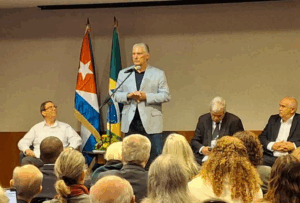 Rio de Janeiro, Brazil.- Cuba will not surrender, President Miguel Díaz-Canel assured on Sunday during an emotional meeting in Rio de Janeiro with the solidarity movement for the island in Brazil, in the context of the XVII BRICS Summit.
Rio de Janeiro, Brazil.- Cuba will not surrender, President Miguel Díaz-Canel assured on Sunday during an emotional meeting in Rio de Janeiro with the solidarity movement for the island in Brazil, in the context of the XVII BRICS Summit.
In a packed room at a Rio de Janeiro hotel, and visibly moved, Díaz-Canel began his remarks with sincere thanks. “We want to begin by deeply thanking you for all the solidarity you have given us. The campaigns, the donations, the support, the altruistic gesture,” he said, acknowledging the many actions of support from the Brazilian people in the face of the difficulties in their country.
He then paused and, in a firm voice, said: “And now we are going to talk to you a little about Cuba and the conditions in which we are living, but also about the lights to overcome the problems. Because what you can be sure of, you, who are friends of real society, is that Cuba will not surrender,” he emphasized.
The Cuban leader once again denounced the US blockade, its extraterritorial nature, and its intensification under recent administrations. “More than 80 percent of our population has lived their entire lives under this siege,” he recalled.
He also explained with political courage the causes of the collapse of the electricity system, which has seriously impacted the daily lives of Cubans and economic development. “The suffering of our people pains us, but we are also convinced that we will move forward,” he stated.
At that point, he emphasized that solidarity not only comforts but also commits us. “We cannot surrender out of conviction, and we cannot surrender because that would be disrespectful to you. The solidarity you give us also commits us greatly,” he emphasized.
Later, in another meeting with Brazilian intellectuals, Díaz-Canel addressed cultural and political issues and denounced the effects of cultural colonization.
The Cuban president criticized the entertainment platforms that impose distorted visions of reality on social media. He called for confronting this offensive with unity in diversity. He also announced an upcoming meeting with political communicators and mentioned the Patria Colloquium, a space to consider and articulate new forms of emancipatory communication.
Looking to the future, he announced that next year will mark the centennial of the birth of the historic leader of the Cuban Revolution, Fidel Castro, with a program of activities focused on the relevance of his thought.
Diaz-Canel revived the concept of “creative resistance,” which, he said, is based on pillars such as popular participation and national unity. “Our people will not give up,” he insisted.
Thus, with firmness and closeness, Díaz-Canel closed both meetings, marked by emotion, commitment and the conviction that, although under siege, Cuba will not surrender.